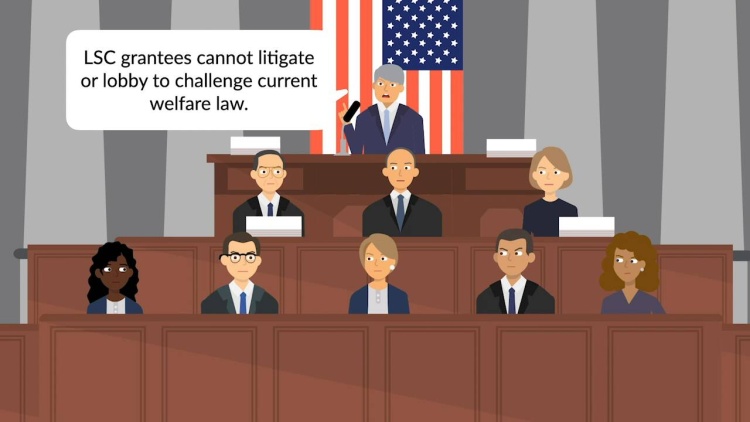Legal Services Corp. v. Velazquez
United States Supreme Court
531 U.S. 533 (2001)
- Written by Megan Petersen, JD
Facts
In 1974, Congress enacted the Legal Services Corporation Act (LSCA) establishing the Legal Services Corporation (LSC) (defendant) as a District of Columbia nonprofit corporation. LSC was tasked with distributing funds appropriated by Congress to eligible local grantee organizations for the purpose of providing financial support for legal assistance in noncriminal proceedings or matters to persons financially unable to afford legal assistance. LSC grantees consisted of hundreds of local organizations governed, typically, by local boards of directors. The grantee organizations hired and supervised lawyers to provide free legal services to indigent clients. Some of the grantee organizations used LSC funds to assist in the representation of indigent clients seeking welfare benefits. However, in 1996, Congress passed a law prohibiting LSC funding of any organization that represented clients in an effort to amend or otherwise challenge existing welfare law. Velasquez and other lawyers employed by LSC grantees (plaintiffs) brought suit in federal district court seeking a declaration that the restriction was invalid. The district court denied relief, but the court of appeals reversed on the grounds that the restriction constituted impermissible viewpoint discrimination in violation of the First Amendment.
Rule of Law
Issue
Holding and Reasoning (Kennedy, J.)
Dissent (Scalia, J.)
What to do next…
Here's why 911,000 law students have relied on our case briefs:
- Written by law professors and practitioners, not other law students. 47,100 briefs, keyed to 997 casebooks. Top-notch customer support.
- The right amount of information, includes the facts, issues, rule of law, holding and reasoning, and any concurrences and dissents.
- Access in your classes, works on your mobile and tablet. Massive library of related video lessons and high quality multiple-choice questions.
- Easy to use, uniform format for every case brief. Written in plain English, not in legalese. Our briefs summarize and simplify; they don’t just repeat the court’s language.





